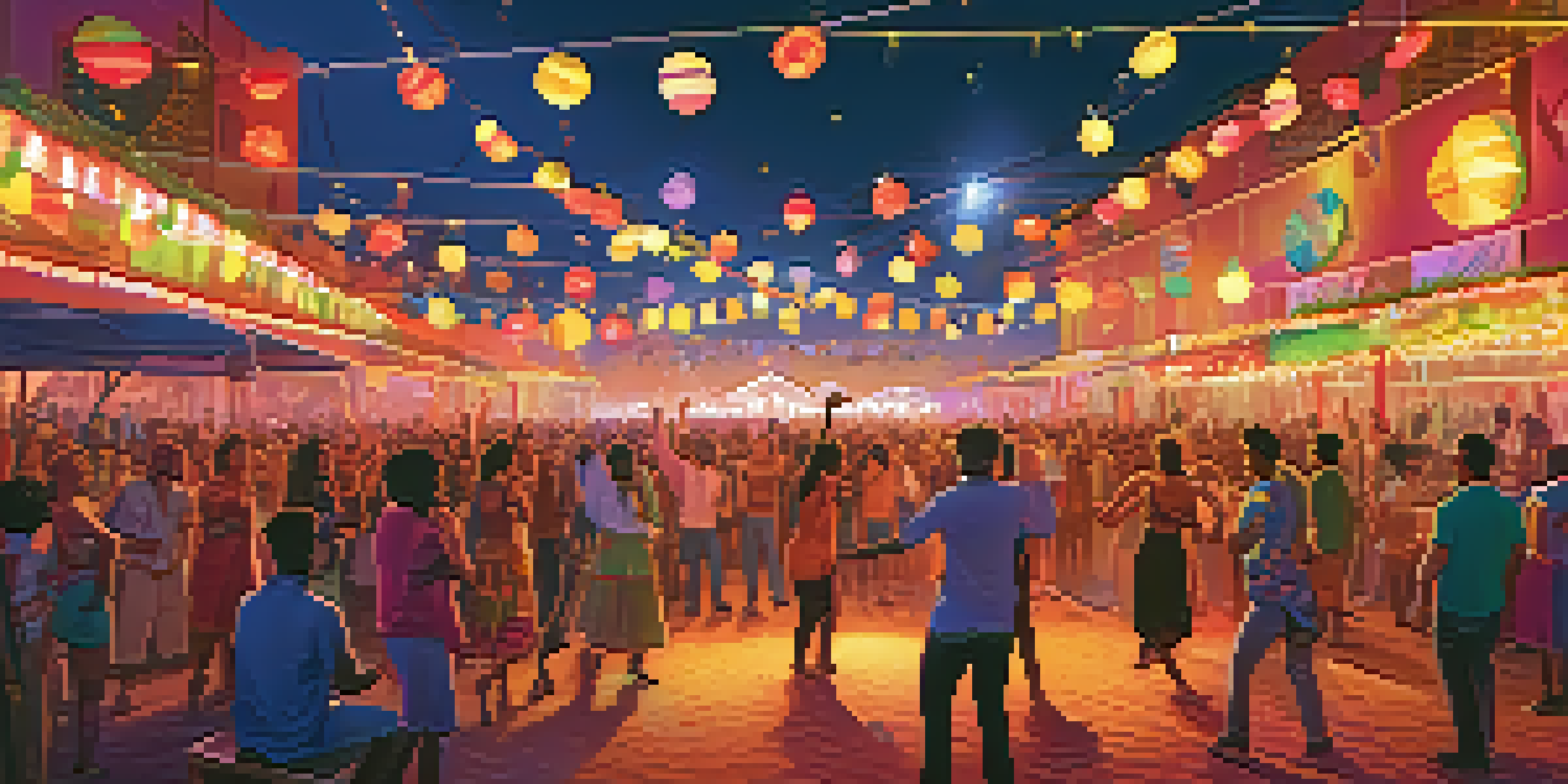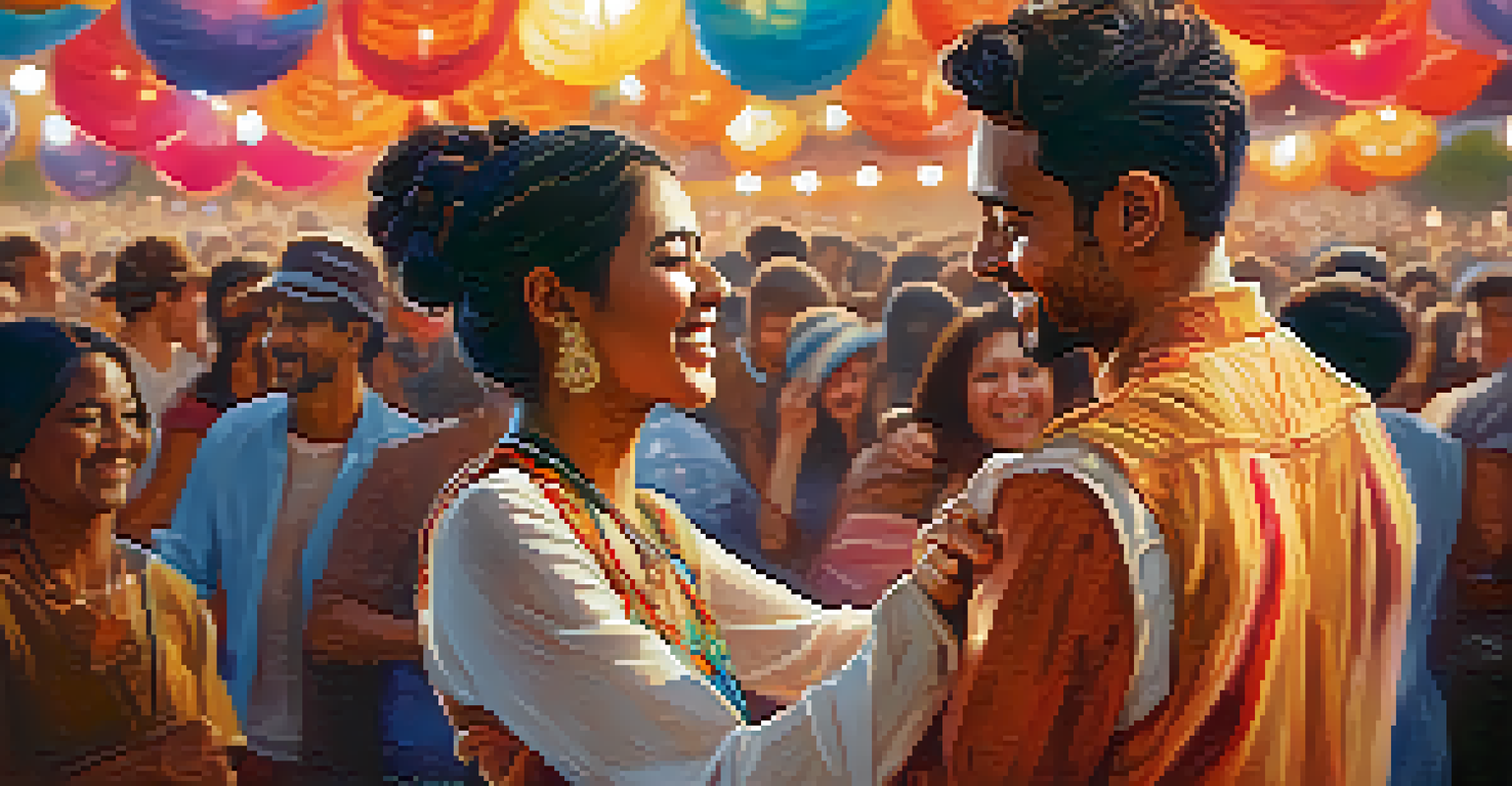The Significance of Music Festivals in Cultural Exchange

Music Festivals as Cultural Melting Pots
Music festivals serve as vibrant melting pots where diverse cultures converge. From the sounds of Afrobeat to the rhythms of Reggae, attendees experience a rich tapestry of musical styles. These events celebrate cultural heritage, allowing participants to connect with traditions that may be different from their own. In essence, festivals create a unique space for cultural exchange and appreciation.
Music can change the world because it can change people.
For example, the annual Coachella Valley Music and Arts Festival in California attracts artists and audiences from all over the globe. This blend of backgrounds and influences fosters an environment where people can learn about one another's traditions through music. Such experiences encourage attendees to embrace and respect cultural differences, promoting a sense of unity.
Moreover, music festivals often include food stalls, art displays, and workshops that showcase the local culture. This holistic approach allows attendees to immerse themselves fully in the cultural experience, forging connections that go beyond just the music. As a result, these festivals become platforms for authentic cultural exchange.
Bridging Gaps Through Shared Musical Experiences
One of the most powerful aspects of music is its ability to transcend language barriers. At music festivals, people from various backgrounds come together to share in the joy of live performances. This shared experience fosters a sense of community, breaking down social barriers and bridging gaps between cultures.

Take, for instance, the Glastonbury Festival in the UK, which attracts a diverse crowd with its eclectic lineup. Attendees may not speak the same language, but when the music starts, everyone sways to the rhythm, united by a common love for the art form. Such moments illustrate how music can create connections that words sometimes cannot.
Cultural Exchange at Festivals
Music festivals create vibrant spaces for diverse cultures to connect and appreciate each other's traditions.
As people dance, sing, and celebrate together, they create lasting memories that can lead to friendships and cultural understanding. These experiences empower individuals to embrace diversity and appreciate the richness that different cultures bring to the global music landscape.
Promoting Local Cultures on a Global Stage
Music festivals not only celebrate international artists but also shine a spotlight on local talent. By featuring regional musicians, festivals become an avenue for local cultures to gain visibility on a global scale. This exposure can lead to greater recognition and appreciation of indigenous music styles and customs.
The music industry is a melting pot of cultures and genres, and music festivals are a reflection of that diversity.
For example, the WOMAD Festival (World of Music, Arts and Dance) showcases artists from various countries, highlighting their unique cultural contributions. This diversity not only enriches the festival experience but also educates audiences about different musical traditions. Attendees leave with a newfound respect for local customs, often leading to further exploration of those cultures.
Moreover, promoting local artists can have a significant economic impact on communities. Increased tourism and interest in local music can stimulate local economies, ensuring that these cultural expressions continue to thrive. Festivals become vital for preserving and promoting cultural heritage in an ever-globalizing world.
Fostering Social Change and Awareness
Beyond entertainment, music festivals often serve as platforms for social change. Many festivals incorporate themes of activism, raising awareness about pressing global issues. This focus encourages attendees to engage with social causes while enjoying the music they love.
For instance, the Global Citizen Festival emphasizes the importance of eradicating poverty and promoting equality. By bringing together influential artists and speakers, the festival mobilizes a diverse audience to take action. Music becomes a catalyst for change, inspiring people to advocate for cultural and social justice.
Music as a Unifying Force
Shared musical experiences at festivals break down language barriers and foster community among attendees.
Additionally, these events often partner with local organizations to support community initiatives. Attendees may find opportunities to volunteer or contribute to charitable causes, further enhancing the festival's impact. This blend of music and activism highlights the potential of cultural exchange to foster positive social change.
Creating Lasting Memories and Connections
The memories created at music festivals often last a lifetime, forming bonds between attendees. Shared experiences—like singing along to a favorite artist or dancing with strangers—forge connections that can transcend time and distance. These moments become cherished stories that people carry with them long after the music fades.
Consider the friendships that blossom at festivals; people from different backgrounds often unite over their shared love for music. Whether it's meeting someone from a different country or forming a bond over a mutual favorite band, these connections enrich lives and broaden perspectives. Festivals act as a reminder of our shared humanity, regardless of cultural differences.
Moreover, social media plays a crucial role in keeping these connections alive. Attendees often share their experiences online, creating a digital tapestry of memories. This not only reinforces the connections made at the festival but also allows others to participate in the cultural exchange, even from afar.
Economic Impact on Local Communities
Music festivals can significantly benefit local economies, providing a boost to businesses and tourism. When festivals attract large crowds, local hotels, restaurants, and shops experience increased patronage. This influx of visitors can create job opportunities and stimulate economic growth in the surrounding area.
Take the example of the New Orleans Jazz & Heritage Festival, which celebrates the city’s rich musical heritage. The festival draws thousands of visitors, directly benefiting local vendors and artists. This economic impact can help sustain cultural institutions and support local talent, ensuring the community thrives.
Economic Boost for Local Areas
Festivals significantly contribute to local economies by attracting tourism and supporting local businesses.
Furthermore, the revenue generated from festivals can be reinvested into community projects and initiatives. This creates a cycle of growth, where music and culture continue to flourish alongside economic development. As a result, festivals become essential for both cultural exchange and community sustainability.
The Future of Music Festivals in Cultural Exchange
As globalization continues to shape our world, music festivals will likely evolve to become even more significant in cultural exchange. With the rise of technology and virtual events, festivals can reach wider audiences, further breaking down geographical barriers. This opens up opportunities for diverse cultures to showcase their music on an unprecedented scale.
Additionally, as cultural awareness grows, festivals may increasingly incorporate themes of inclusivity and sustainability. Attendees are becoming more conscious of the impact of their choices, and festivals that align with these values will likely attract more visitors. This shift can enhance the cultural exchange experience, promoting respect for both local and global communities.

Ultimately, the future of music festivals lies in their ability to adapt and innovate. By embracing new technologies and fostering inclusivity, they can continue to play a vital role in promoting cultural exchange and celebrating the power of music to unite people from all walks of life.